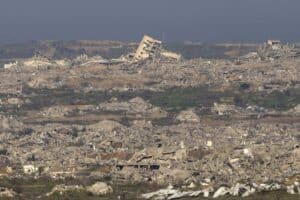Israel resumed its Gaza offensive on 18 March, ending a two-month truce in the war.

Israel’s military launched intensified Gaza operations on Saturday aimed at “the defeat of Hamas”, with rescuers in the besieged Palestinian territory reporting at least 10 killed by new Israeli strikes.
The stepped-up campaign came amid increasing international concern about the humanitarian situation in Gaza which continues to worsen amid an Israeli aid blockade.
One of the territory’s last functioning hospitals warned it could no longer treat seriously wounded patients because of shortages and damage from a nearby attack.
It also came as Hamas said a new round of indirect negotiations with Israel “without any preconditions” aimed at ending the war had started in Doha.
Israel’s expansion of the battle in Gaza
Israel’s military called the new operation part of “the expansion of the battle in the Gaza Strip, with the goal of achieving all the war’s objectives, including the release of the abducted and the defeat of Hamas”.
It said it had “launched extensive strikes and transferred forces to seize control of areas within the Gaza Strip”.
Addressing an Arab League summit in Baghdad, United Nations chief Antonio Guterres said he was “alarmed” at the expansion, adding: “We need a permanent ceasefire, now.”
The summit’s final statement urged the international community “to exert pressure to end the bloodshed and ensure that urgent humanitarian aid can enter without obstacles”.
Italy urged Israel to stop its military strikes, with Foreign Minister Antonio Tajani saying: “Enough with the attacks.”
The German government said it was “deeply concerned” about the Israeli offensive.
Gaza civil defence agency spokesman Mahmud Bassal said 10 bodies were brought to hospitals on Saturday morning a day after Israeli strikes killed at least 100 people.
ALSO READ: Israel cabinet approves plan for Gaza ‘conquest’
In the central city of Deir el-Balah, displaced Gazans sifted through belongings, some bloodstained, for whatever could be salvaged after overnight strikes hit their tents.
“We woke up at half past two in the morning to the sound of a loud explosion that shook the entire area,” said Umm Fadi Quzaat.
“There was blood and body parts everywhere.”
Israel resumed its Gaza offensive on 18 March, ending a two-month truce in the war triggered by Hamas’s October 2023 attack.
UN human rights chief Volker Turk on Friday denounced the renewed attacks and what he described as an apparent push to permanently displace Gaza’s inhabitants as being “tantamount to ethnic cleansing”.
Doha talks
Senior Hamas official Taher al-Nunu said Saturday new talks on ending the war had begun in Doha “without any preconditions from either side”.
“Hamas will present its viewpoint on all issues, especially ending the war, (Israel’s) withdrawal and prisoner exchange,” he added.
Previous negotiations failed to secure a breakthrough, but the talks have been ongoing, with Israeli Prime Minister Benjamin Netanyahu saying this week he had told negotiators to head for the Qatari capital.
Israeli Defence Minister Israel Katz credited the intensified campaign with bringing Hamas back to the table – “in contrast to the recalcitrant position they had taken up until that moment”.
READ MORE: Israel accused of starving Gaza ‘by design’ — South Africa addresses ICJ
Both sides have insisted on certain conditions, with Hamas saying disarmament was a red line and Netanyahu unwilling to agree to a deal that would leave the group intact.
At the Arab League summit, Palestinian president Mahmud Abbas called on leaders to adopt a Palestinian Authority-led plan to end the war under which “Hamas would relinquish its control” of Gaza and “hand over its weapons” to the PA.
The plan would also involve a permanent ceasefire, the release of hostages, humanitarian aid entering Gaza and an Israel’s withdrawal from the Strip, he said, as well as “a political process” for implementing a two-state solution.
‘Catastrophic’
Israel has faced increasing pressure to lift its aid blockade, as UN agencies warn of critical shortages of food, clean water, fuel and medicines.
Marwan Sultan, director of the Indonesian Hospital in northern Gaza, said the situation there Saturday was “catastrophic after its surroundings were targeted again this morning”.
The hospital was “unable to receive any more critical cases” amid “a severe shortage” of blood units, medicine and supplies, he said.
Hamas’s 7 October 2023 attack resulted in the deaths of 1 218 people on the Israeli side, mostly civilians, according to an AFP tally based on official figures.
Of the 251 hostages taken during the attack, 57 remain in Gaza, including 34 the military says are dead.
The health ministry in the Hamas-run territory said 3 131 people have been killed since Israel resumed strikes on 18 March, taking the war’s overall toll to 53 272.
NOW READ: Qatar’s chief negotiator says ‘frustrated’ by pace of Gaza talks






